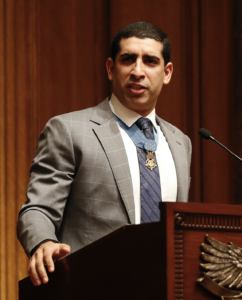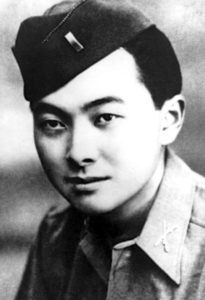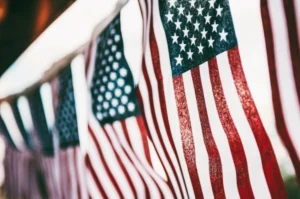
Ernest E. West, who passed away on May 1, 2021, was one of four, now three, remaining recipients of the Medal of Honor from the Korean War. A native of rural Kentucky, he was drafted into the U.S. Army and distinguished himself in combat on October 12, 1952, when he accompanied a combat patrol assaulting an enemy outpost. During the action, he retrieved his wounded platoon leader under fire and killed six enemy soldiers in close combat despite losing his eye. After the war concluded, West received the Medal of Honor from President Dwight D. Eisenhower at the White House on January 12, 1954. He then returned to his native Kentucky, and his prewar job with the Chesapeake & Ohio Railroad, living quietly there for the remainder of his life. He was, according to a member of the Medal of Honor Committee from Greenup County, Kentucky, “A man who loved his family and his community. A man who would talk more about his fishing adventures at Dale Hollow than recalling his heroic actions of the Korean war.”
Biographical Information:
Medal of Honor Action: October 12, 1952
Medal of Honor Awarded: January 12, 1954
Presenter: President Dwight D. Eisenhower
Unit: Company L, 3d Battalion, 14th Infantry Regiment, 25th Infantry Division
Location of Action: Near Sataeri, Korea
Date of Birth: September 2, 1931
Place of Birth: Russell, Greenup County, Kentucky
Date of Death: May 1, 2021
Early Life
Ernest E. West was born into a poor family in the small town of Wurtland, Kentucky, along the Ohio River on September 2, 1931. When he was just nine years old, he and his sister were brought to live in the Methodist Orphans Home in Versailles near Lexington, Kentucky. He would live there until he was 17-years-old. Rev. Clyde Sweazey, who superintended the Home, remembered that “Ernest was the boy who never attempted to shirk any responsibility or to get anyone else to do his job for him.” West had the job of ringing the Home’s bell at 5:45 every morning, and Sweazy recalled that “It was always safe to set his watch by the bell.” Of this time, West said, “I was raised with 125 brothers… We all stuck together. We thought we were brothers and still think that way, I guess.” He also was remembered, “… as a hard-driving lineman on the Versailles High School football team, even during the years that he was in the seventh and eighth grades.” After graduation, he returned to Wurtland to live with his mother and work as an electrician apprentice on the Chesapeake and Ohio Railroad, working side by side with future (posthumous) Medal of Honor recipient John W. Collier, until West was drafted into the U.S. Army in 1950.
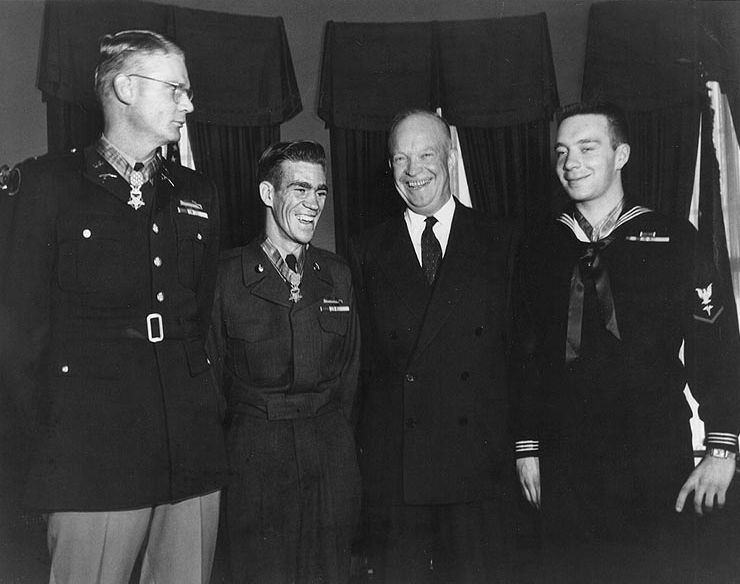
Medal of Honor Action
West was serving as a private first class with the 2d Squad, 3d Platoon, Company L, 3d Battalion, 14th Infantry Regiment, 25th Infantry Division near Sataeri, along what is now the border between North Korea and South Korea, when he volunteered to join a patrol sent out to find and destroy an enemy outpost on October 12, 1952. West was serving as point man for the three-squad patrol as it climbed up a ridge toward the outpost, when it was ambushed and suffered severe casualties, including its leader, Lieutenant George M. Gividine, who was left injured and exposed to enemy fire. Private First Class West, ordering the other men to pull back, went out alone to retrieve the lieutenant. While he was doing so, three enemy soldiers attacked him with rifles and grenades. West interposed himself between the lieutenant and the enemy, and managed to kill all three of them with his rifle. He then carried to safety Gividine, who survived the war. Although badly wounded with an injury that would cost him his left eye, West remained in action to rescue two more of his wounded comrades, killing three more enemy soldiers in the process.
After the War
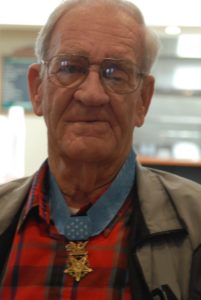
West spent ten months in the hospital after this action. Returning home to the United States, West learned that the railroad he had worked for before the war was reluctant to rehire him because of his visual disability. Community pressure in the form of phone calls to the Veterans’ Administration helped to ensure his rehiring, for West was hailed as a hero in his native Greenup County, Kentucky after it was announced he would receive the Medal of Honor. West nevertheless told the crowds who praised him as he set off for Washington, D.C., that he felt he didn’t deserve the medal; and in fact, he had tried to decline it. “I told them I didn’t want it,” West later recalled. “I thought if one was going to get a medal, everybody ought to have one. We all went, we all served-if you give one, you ought to give one to everybody. That’s the way I feel about it-but they don’t.” Presenting the Medal of Honor to West, President Dwight D. Eisenhower said, “In addition to this decoration, you have an old soldier’s admiration.”
On the job, West suffered from the effects of post-traumatic stress. When a coworker clapped him on the back, West turned and wrestled his colleague to the ground, telling him apologetically afterwards, “just talk to me. Don’t touch me.” In time those effects would fade, and he looked back to his time in the service as a period of brotherhood. Of the comrades whose lives he had saved, West said: “They would have done it for me. I’m sure of that. We never did leave anybody behind-we called it brotherhood back in the ’50s.” For him, that brotherhood included his black comrades in this newly integrated Army: “Back then, if you were black, you didn’t associate with me and I didn’t associate with you. I thought it was wrong then and I think it’s wrong today. We’re all equal. We might not be the same color-but color doesn’t have a damned thing to do with it. I still say we’re all brothers, all sisters. That’s the way I felt about it then and always have.”
West worked for the railroad until his retirement in 1993, and also enjoyed hunting and fishing. He also volunteered his time to speak to local schoolchildren, and to advocate for veterans’ causes, including the establishment of a veterans’ cemetery in his native Greenup County.
Medal of Honor Citation
Pfc. West distinguished himself by conspicuous gallantry above and beyond the call of duty in action against the enemy. He voluntarily accompanied a contingent to locate and destroy a reported enemy outpost. Nearing the objective, the patrol was ambushed and suffered numerous casualties. Observing his wounded leader lying in an exposed position, Pfc. West ordered the troops to withdraw, then braved intense fire to reach and assist him. While attempting evacuation, he was attacked by three hostile soldiers employing grenades and small-arms fire. Quickly shifting his body to shelter the officer, he killed the assailants with his rifle, then carried the helpless man to safety. He was critically wounded and lost an eye in this action, but courageously returned through withering fire and bursting shells to assist the wounded. While evacuating two comrades, he closed with and killed three more of the foe. Pfc. West’s indomitable spirit, consummate valor, and intrepid actions inspired all who observed him, reflect the highest credit on himself, and uphold the honored traditions of the military service.
Learn More About Ernest West:
U.S. Army: Medal of Honor recipient still lives by Soldier creed
Congressional Medal of Honor Society: Medal of Honor Recipient Ernest E. West Passes Away at 89
Kentucky Today: War hero and Medal of Honor recipient Ernie West dies at 89
Media
